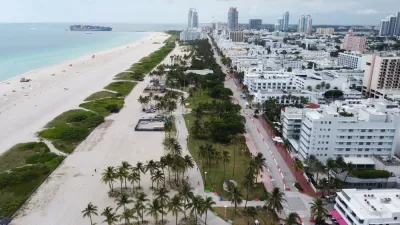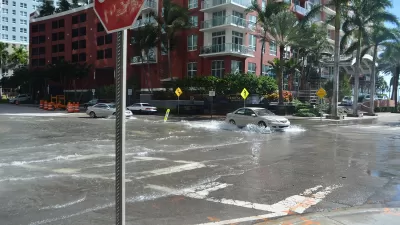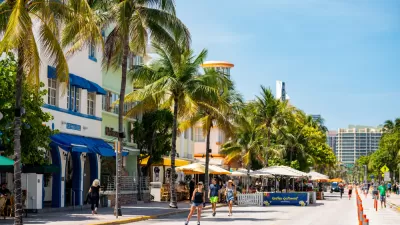Recent controversies have inspired county and city officials in Miami-Dade County looking to overhaul the process by which transportation projects are planned, approved, and funded.
"Miami-Dade commissioners and representatives of municipalities in the county have begun a process to radically change the way transportation projects are planned locally in a bid to speed up the creation of new services such as express buses or light-rail systems," reports Alfonso Chardy.
Under the current system: "agencies such as the Florida Department of Transportation (FDOT) bring projects for approval or rejection to the Metropolitan Planning Organization (MPO), which includes Miami-Dade commissioners as well as representatives of municipalities such as the City of Miami and the mayors of Hialeah, Homestead, Miami Beach, Miami Gardens and North Miami."
"But at a meeting last week of the special MPO committee to find transit solutions, Moss said that it should be the MPO that crafts the plans and then directs the agencies to carry them out," according to Chardy.
The discussion about the project approval process in Miami-Dade County is taking place amid a controversy over increased tolls on state roads 836 and 112. A recent failed legislative effort at the state of Florida also would have overhauled the governance structure of the Miami-Dade Expressway Authority. County and city commissioners are also current considering the financing of a plan by Tri-Rail to bring commuter rail service to downtown Miami from Broward and Palm Beach counties.
FULL STORY: Miami-Dade leaders want to speed up public-transport projects

Alabama: Trump Terminates Settlements for Black Communities Harmed By Raw Sewage
Trump deemed the landmark civil rights agreement “illegal DEI and environmental justice policy.”

Planetizen Federal Action Tracker
A weekly monitor of how Trump’s orders and actions are impacting planners and planning in America.

The 120 Year Old Tiny Home Villages That Sheltered San Francisco’s Earthquake Refugees
More than a century ago, San Francisco mobilized to house thousands of residents displaced by the 1906 earthquake. Could their strategy offer a model for the present?

In Both Crashes and Crime, Public Transportation is Far Safer than Driving
Contrary to popular assumptions, public transportation has far lower crash and crime rates than automobile travel. For safer communities, improve and encourage transit travel.

Report: Zoning Reforms Should Complement Nashville’s Ambitious Transit Plan
Without reform, restrictive zoning codes will limit the impact of the city’s planned transit expansion and could exclude some of the residents who depend on transit the most.

Judge Orders Release of Frozen IRA, IIJA Funding
The decision is a victory for environmental groups who charged that freezing funds for critical infrastructure and disaster response programs caused “real and irreparable harm” to communities.
Urban Design for Planners 1: Software Tools
This six-course series explores essential urban design concepts using open source software and equips planners with the tools they need to participate fully in the urban design process.
Planning for Universal Design
Learn the tools for implementing Universal Design in planning regulations.
Clanton & Associates, Inc.
Jessamine County Fiscal Court
Institute for Housing and Urban Development Studies (IHS)
City of Grandview
Harvard GSD Executive Education
Toledo-Lucas County Plan Commissions
Salt Lake City
NYU Wagner Graduate School of Public Service





























